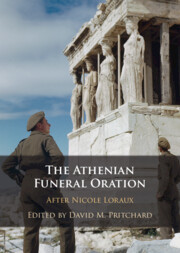Book contents
- The Athenian Funeral Oration
- The Athenian Funeral Oration
- Copyright page
- Contents
- Figures and Tables
- Contributors
- Foreword
- Preface
- Abbreviations
- 1 The Funeral Oration after Loraux
- Part I Contexts
- Part II The Historical Speeches
- 5 The Epitaphios Logos of Pericles: Thucydides’ Ambivalence towards the Genre
- 6 Demosthenes after the Defeat
- 7 Originality and Tradition in Hyperides’ Funeral Oration
- Part III The Literary Examples
- Part IV Intertextuality
- Part V The Language of Democracy
- References
- General Index
- Index of Sources
5 - The Epitaphios Logos of Pericles: Thucydides’ Ambivalence towards the Genre
from Part II - The Historical Speeches
Published online by Cambridge University Press: 11 January 2024
- The Athenian Funeral Oration
- The Athenian Funeral Oration
- Copyright page
- Contents
- Figures and Tables
- Contributors
- Foreword
- Preface
- Abbreviations
- 1 The Funeral Oration after Loraux
- Part I Contexts
- Part II The Historical Speeches
- 5 The Epitaphios Logos of Pericles: Thucydides’ Ambivalence towards the Genre
- 6 Demosthenes after the Defeat
- 7 Originality and Tradition in Hyperides’ Funeral Oration
- Part III The Literary Examples
- Part IV Intertextuality
- Part V The Language of Democracy
- References
- General Index
- Index of Sources
Summary
This chapter tests (and largely confirms) Nicole Loraux’s intriguing hypotheses concerning the authenticity of Pericles’ famous funeral oration and Thucydides’s ambivalent attitude towards this genre. It argues that Thucydides’ funeral speech of Pericles (2.35–46) owes much to the actual speech that the historical Pericles delivered in 431/0 BC to calm the widespread dissatisfaction with his policy of restraint vis-à-vis the Peloponnesian invaders. To achieve this end, Pericles focussed on one of the epitaphic commonplaces, namely the Athenians’ democracy and way of life as one of the reasons for their exceptional courage. Considering that Thucydides is highly critical of the epitaphic orators’ distorted version of the Athenian past (1.21.1), the inclusion of this funeral speech in his history may seem surprising, but it allowed Thucydides to explore the institutional/cultural reasons for the Athenians’ remarkable war-making ability, which his Corinthians had attributed earlier to the Athenians’ nature (1.70). Thucydides is not uncritical of Pericles’ idealization of Athens, though. By creating deliberate verbal echoes of Pericles’s eulogy in earlier and later passages of his work, Thucydides used the epitaphios logos of Pericles as a crucial point of comparison to illustrate the destructive impact of the war on the Athenians.
- Type
- Chapter
- Information
- The Athenian Funeral OrationAfter Nicole Loraux, pp. 115 - 139Publisher: Cambridge University PressPrint publication year: 2024

